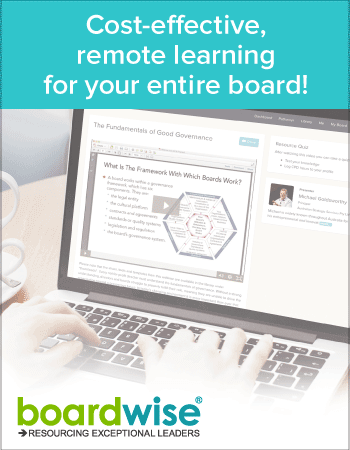What is the purpose of a board pack?
-
boardpacks
Board Packs What is the purpose of a board pack?
The core purpose of a board pack is to provide directors with the crucial information they require to properly carry out their duties and responsibilities.
A well-constructed board pack empowers directors to participate in informed, productive discussion and make sound decisions that advance the organisation’s interests.
Specifically, a quality board pack aims to:
-
Deliver the right information to the directors at the right time. Directors need the right materials sufficiently in advance to review and prepare for upcoming board meetings. Last minute submissions are counterproductive.
-
Blends procedural documents like agendas, minutes, and committee reports that allow the board to function smoothly (and be compliant with legislation) with insightful analysis, data and recommendations that help encourage wise strategic guidance.
-
Give directors a balance of big picture perspective and relevant granular details so they grasp issues comprehensively without getting mired in trivial operational minutiae.
-
Arm directors with everything they need to know to debate agenda issues constructively and reach conclusions aligned with stakeholders’ best interests, without significant information gaps.
-
Avoid overwhelming directors with excessive unrelated facts and figures that obscure focus on the most critical matters and decisions. Information overload hinders the ability of directors to absorb relevant and pertinent information. Work to reduce the size of your packs.
-
Provide quality information in a well organised manner and in an easily digested format suited to directors’ requirements. Use Charts, summaries and defined terms to clarify complex subjects.
-
Instil the boards confidence in management’s capabilities and create transparency by demonstrating rigorous, consistent reporting processes that deliver what the board requires to govern effectively.
-
Promote fruitful collaboration between the board and management by aligning understanding of information needs in both directions.
In summary, a board pack gives directors the understanding they need to provide leadership through sound governance and strategy guidance grounded in substantive knowledge. It’s a critical information channel enabling directors to fulfil their duties in service of organisational performance and stakeholder interests.
The mark of a successful and effective board pack is simple - engaged directors who are empowered by comprehensive and digestible information to participate in robust strategic discussion and quality decision making.
Additional Resources
Welcoming and Initiating New Board Members
Company Secretary Playbook: Effective Board Meetings
Why Miscommunication Happens Among Directors
Streamlining the Work of the Board
Frequently Asked Questions
What should be included in a board pack?
- Cover letter from the CEO or board secretary outlining the key items for discussion and any highlights or areas requiring special attention
- Agenda for the upcoming board meeting
- Minutes from the previous board meeting
- Financial statements and reports
- Performance reports such as sales, marketing, operations
- Proposed budgets or financial plans
- Presentations on key topics
- Background materials, research or supporting documents for major agenda items
- Committee reports and minutes if applicable
- Legal, regulatory or compliance updates
- Confidential matters or supplementary info marked as sensitive
- Administrative items like schedule of future meetings, calendars, etc.
How do you compile a board pack?
- Set the agenda for the upcoming meeting based on standard recurring topics and any special issues arising
- Request preparation of reports, presentations and materials from management, finance, legal etc
- Review, finalise and sequence the agenda
- Compile and collate all documents, ensuring completeness and consistency
- Distribute the board pack to directors with sufficient time for review
- Follow up on any missing items and circulate updates or additions
- Print sufficient copies for use during the meeting (if still using printed documents)
- Arrange meeting logistics like venue, meals, equipment
- Archive final board pack and materials for records and future reference
-



